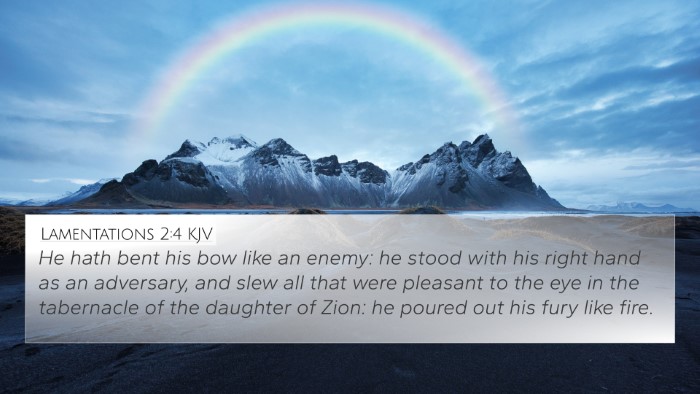Lamentations 3:12 - Meaning and Interpretation
Lamentations 3:12 states: “He hath bent his bow, and set me as a mark for the arrow.” This verse is situated within a context of deep lamentation and sorrow following the destruction of Jerusalem. The imagery of God bending His bow and setting the speaker, understood to be the prophet Jeremiah, as a target starkly illustrates the profound sense of suffering and divine judgment.
This passage can be further explored through various public domain commentaries:
Insights from Matthew Henry
Matthew Henry notes that the metaphor of God as an archer emphasizes the perceived hostility and severity of God's judgment. In this context, God is not merely a distant observer but is actively engaged in the judgment of His people, showcasing His power and authority over human affairs.
Views from Albert Barnes
Albert Barnes elaborates on the poetic imagery, indicating that the bow represents the instruments of God's discipline. The arrows symbolize the afflictions sent forth against the people. Barnes emphasizes that God's intentions are not to cause suffering without purpose but rather to lead His people toward repentance and restoration.
Analysis by Adam Clarke
Adam Clarke sheds light on the metaphorical language, suggesting that being a mark for arrows indicates vulnerability and exposure to danger. Clarke posits that this expression reflects not only personal suffering but also a corporate experience of the nation of Israel under God’s judgment.
Cross-References and Thematic Connections
- Psalm 38:2: “For your arrows have sunk deep into me, and your blows are pressing down on me.” This verse similarly speaks to God’s arrows as instruments of discipline and consequence.
- Hebrews 12:6: “For whom the Lord loves He chastens, and scourges every son whom He receives.” This passage ties the themes of divine correction to the inherent love of God.
- Job 6:4: “For the arrows of the Almighty are within me.” Job also experiences the suffering associated with feeling targeted by God’s judgment.
- Psalm 22:16: “For dogs have encompassed me: the assembly of the wicked have inclosed me: they pierced my hands and my feet.” This wrongful suffering presages themes of suffering found in the New Testament, connected through the suffering Messiah.
- Lamentations 2:4: “He has bent his bow like an enemy; he stood with his right hand like an adversary.” This earlier verse echoes similar themes of God’s wrath and the sense of being attacked.
- Isaiah 63:10: “But they rebelled and grieved His Holy Spirit; therefore, He turned to be their enemy, and himself fought against them.” Here the consequence of rebellion against God is echoed, demonstrating how divine favor can turn into judgment.
- Psalm 64:3: “And they whet their tongue like a sword, and bend their bows to shoot their arrows, even bitter words.” This highlights the connections between spiritual attacks and divine judgment.
Thematic Bible Verse Connections
This verse in Lamentations introduces broader themes of divine discipline, judgment, and restoration. The interconnectedness of suffering and God’s love surfaces throughout scripture, as demonstrated by the following themes:
- Discipline and Growth: The act of God afflicting His people is seen as a means to bring them closer to Him, leading to genuine repentance.
- Judgment and Hope: While the imagery is stark, underlying these judgments is always a thread of hope for restoration and divine mercy.
- Connection between Suffering and Redemptive History: The suffering described in Lamentations reflects the larger narrative of Israel’s history and the anticipated coming of the Messiah, who would also suffer for humanity's redemption.
Practical Applications
Understanding Lamentations 3:12 through these commentaries invites reflection on personal trials, encouraging believers to view their suffering as potentially redemptive and formative. It builds the case for viewing individual suffering as part of a larger divine narrative where God’s "arrows" are pathways toward healing and growth.
How to Use Bible Cross-References for Study
By utilizing tools for Bible cross-referencing, individuals can uncover deeper meanings within scriptures. Here are some tips:
- Use a Bible concordance to find common words and themes between verses.
- Utilize a cross-reference Bible study tool to explore interconnectivity between various books of the Bible.
- Explore thematic studies by identifying links between various Testaments.
- Engage in comparative Bible verse analysis to reveal parallels and contrasts that enhance understanding.
Further Study and Reflection
In summary, Lamentations 3:12 serves as a profound reminder of God’s sovereignty, the reality of divine judgment, and the necessity of repentance. By engaging with the cross-references provided, one can develop a more comprehensive understanding of the spiritual ramifications of suffering and the hope found in God’s love within the broader narrative of scripture.








